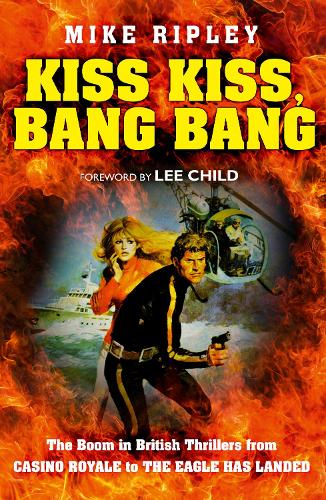
Kiss Kiss, Bang Bang: The Boom in British Thrillers from Casino Royale to The Eagle Has Landed
(Paperback)
Publishing Details
Kiss Kiss, Bang Bang: The Boom in British Thrillers from Casino Royale to The Eagle Has Landed
By (Author) Mike Ripley
HarperCollins Publishers
HarperCollins
18th March 2019
United Kingdom
Classifications
General
Non Fiction
823.087209
Physical Properties
Paperback
464
Width 129mm, Height 198mm, Spine 29mm
330g
Description
WINNER OF THE HRF KEATING AWARD FOR BEST NON-FICTION CRIME BOOK 2018
An entertaining history of British thrillers from Casino Royale to The Eagle Has Landed, in which award-winning crime writer Mike Ripley reveals that, though Britain may have lost an empire, her thrillers helped save the world. With a foreword by Lee Child.
When Ian Fleming dismissed his books in a 1956 letter to Raymond Chandler as straight pillow fantasies of the bang-bang, kiss-kiss variety he was being typically immodest. In three short years, his James Bond novels were already spearheading a boom in thriller fiction that would dominate the bestseller lists, not just in Britain, but internationally.
The decade following World War II had seen Britain lose an Empire, demoted in terms of global power and status and economically crippled by debt; yet its fictional spies, secret agents, soldiers, sailors and even (occasionally) journalists were now saving the world on a regular basis.
From Ian Fleming and Alistair MacLean in the 1950s through Desmond Bagley, Dick Francis, Len Deighton and John Le Carr in the 1960s, to Frederick Forsyth and Jack Higgins in the 1970s.
Many have been labelled boys books written by men who probably never grew up but, as award-winning writer and critic Mike Ripley recounts, the thrillers of this period provided the reader with thrills, adventure and escapism, usually in exotic settings, or as todays leading thriller writer Lee Child puts it in his Foreword: the thrill of immersion in a fast and gaudy world.
In Kiss Kiss, Bang Bang, Ripley examines the rise of the thriller from the austere 1950s through the boom time of the Swinging Sixties and early 1970s, examining some 150 British authors (plus a few notable South Africans). Drawing upon conversations with many of the authors mentioned in the book, he shows how British writers, working very much in the shadow of World War II, came to dominate the field of adventure thrillers and the two types of spy story spy fantasy (as epitomised by Ian Flemings James Bond) and the more realistic spy fiction created by Deighton, Le Carr and Ted Allbeury, plus the many variations (and imitators) in between.
Reviews
As gripping and well-researched as any of the thrillers he discusses, Mike Ripley's book also provides a fascinating social history of post-war Britain. A reminder of the relevance of this unfairly maligned genre. Check the room for bugs, settle down, and dive in.
Ian Rankin
Witty and authoritative
Andrew Taylor, SPECTATOR
A blissfully enjoyable study of the golden age of the British thriller
SUNDAY TELEGRAPH
Highly entertaining this informative book should send readers back to the thrillers of yesteryear
THE TIMES
Ripley writes with breezy, infectious enthusiasm Above all, though, Ripley conveys something of why these books are exciting. WASHINGTON POST
Author Bio
Mike Ripley was born in 1952. As well as being a noted critic and Lecturer in Crime Writing, he is the author of the Angel series of crime novels, for which he has twice been the recipient of a Crime Writers Association Award. Working with the Margery Allingham Society, he completed the Albert Campion novel left unfinished, Mr Campions Farewell, and has written further continuation novels in the series.
